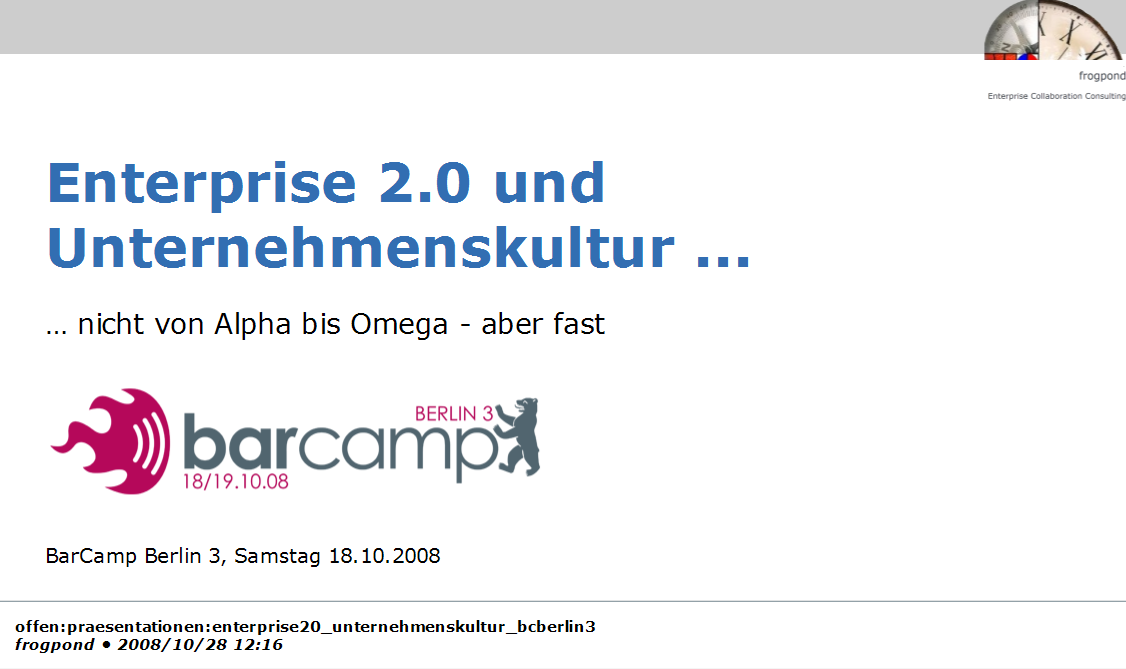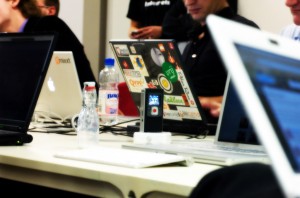
Ein paar Notizen zum ersten Tag beim BarCamp Berlin 3 – insbesondere zu den von mir besuchten Sessions, die Folien und Notizen zu meiner Session “Unternehmenskultur und Enterprise 2.0” folgen.
- E-Learning 2.0 (scooyoo.de o.ä.)
- Wissensmanagement 2.0
Die Session zu E-Learning 2.0 hat mich nicht begeistert, zum einen war das mehr eine Firmenpräsentation, zum anderen war das nicht so innovativ. Im Grunde nicht mehr als die “Internetifizierung” von klassischen Edutainment-Angeboten für Schüler – halt eine Internetplattform. Es waren keine Social-Learning Elemente erkennbar, abgesehen von Dingen, die ich eher kritisch sehe. Was bringt es einem Schüler wenn er sieht dass er auf Platz 267 von 500 Schülern ist (Rating? …) – ebenso fand ich es fragwürdig dass das Feedback im Lernprozess eher trivial war. Auch das Fragendesign (bspw. Lückentexte in die die passenden Worte “hineingezogen” werden müssen) war nicht überzeugend. Ob das der aktuelle Stand des pädagogischen Herangehens für Mittelstufenschüler ist?
Zweite Session zu Wissensmanagement 2.0, mit Stefan Ehrlich von T-Systems MMS, diese hatte mehr einen einführendenCharakter, bzw. war ein Erfahrungsbericht aus dem Einsatz bei der MMS. Einige Notizen:
– alt: Wissensmanagement 1.0 – Informationsverwaltung und -verteilung. Ja, ” “Wissensmanagement” ist zwischenzeitlich aus der Mode gekommen, mit Enterprise Social Software wird das “wiederbelebt”
– einige Ausführungen zu den Erfahrungen der MMS mit dem Teamweb (u.a. wurde auch kurz das Strategie-Wiki angesprochen, das übrigens auch in diesem Interview mit Peter Klingenburg Thema war), zuerst aber zum Hintergrund der Firma. Mit drei Worten: Profit Center Organisation. D.h. auch verteilte Kompetenzen in den einzelnen Centern, mit der Folge dass die Zusammenarbeit in diesen großen Einheiten nicht einfach ist, auch weil verschiedene Sprachen und Terminologien in den verschiedenen Centern bestehen. Gleichzeitig gibt es viele Gemeinsamkeiten, bspw. Projektmanagement als grundlegende Methode.
Die Frage war nun wie die Kommunikation zwischen diesen Einheiten gefördert werden lann (ich würde ergänzen, dass es mehr noch darum geht die Kollaboration zu fördern). Die bis dato verwendete Lösung war es Competence Centers für die bereichsübergreifende Abstimmung zu installieren, diese fokussierten sich vor allem auf diese überall benötigten “Gleich-Kompetenzen”. Allerdings passierte in den ergänzten Competence Centern nicht viel, die Aktivitäten waren überschaubar – nach wie vor waren die Profit-Center der Schwerpunkt des Business (selbstverständlich, ja).
Was also tun? Coaching, Leadership und “Anreizsysteme” (ja, kritisch), Veränderung der Motivationsstrukturen und der Unternehmenskultur, … mehr dazu später im Post zu meiner Session (“Unternehmenskultur und Enterprise 2.0”).
Was wurde bei der MMS gemacht? Relativ ungezwungene Einführung eines Confluence-Wikis als “Experiment” und die Beobachtung was sich an emergenter Nutzung ergab, d.h. was wurde mit dem Werkzeug wirklich gemacht? Eine Beobachtung war es, dass sich auf der Wiki-Plattform die Profit-Center Struktur nicht widerspiegelt – es bilden sich vielmehr thematisch bezogene Communities heraus. Allerdings war bei der MMS die Nutzung der Plattform nicht natürlich, auch hier bestehen nach wie vor Bedenken und Ängste, bspw. vor kritischem Feedback. So nutzen manche das Wiki nur für Basisaufgaben wie bspw. die Vor- und Nachbereitung von Meetings, nun ja das ist meiner Meinung nach nicht notwendigerweise schlecht, die Hauptsache ist es ja dass es überhaupt genutzt wird.
Eine der Erwartungen war es Expertise bzw. Mitarbeiter mit Expertise durch das Wiki leicht auffindbar zu machen – in der Folge wird das Teamweb im wesentlichen auch dafür genutzt. Das zugrundeliegende Paradigma ist mithin: es geht weniger um “Codified Knowledge”, als um das Finden von MA die Probleme lösen können. Klar, personenfokussiertes Wissensmanagement ist prinzipiell ein guter Ansatz – hat aber natürlich auch Nachteile u.a. ist das noch keine Lösung für den Wissenstransfer (und auch keine Lösung wenn die Kompetenzträger das Unternehmen verlassen würden). Kodifiziertes Wissen ist zudem auch nicht einfach, u.a. weil Wissen stark vom Kontext abhängt – in der Folge kann es schlecht zwischen heterogenen Kontexten transportiert werden.
Die MMS plant nun mehr Unterstützung und Verständnis beim Management zu schaffen (die Vorteile zeigen, um Budget und Support etc. zu bekommen), sowie die Einführung eines Employee Social Networks im Unternehmen. Ich denke das macht Sinn, gerade um die “Knowledge Hubs” im Unternehmen zu identifizieren, und diese als Ausgangspunkte für Knowledge Cluster gewinnen. Eine Möglichkeit ist es, dass sich die Kompetenz- und Wissensträger quasi “selbstselektieren” können, und letztlich vorrangig flexible Plattformen bereitzustellen, die die Ausformung der Wissensnetze unterstützt aber nicht vorgibt. Ein Problem ist ja, dass gerade die Mitarbeiter mit den spannendsten Kompetenzen oft am wenigsten Zeit haben, bzw. unwillig sind ihr Wissen zu teilen. Positiv formuliert – oft haben genau diese Leute keine Zeit ihr Wissen zu teilen, sie “fahren besser” wenn sie weniger sichtbar sind, da dann mehr Zeit für die persönlich als spannender empfundenen Sachen bleibt. Dahinter steht die Aufgabe wie man diese Aufgabe der Wissensverteilung zu einer spannenden Aufgabe machen kann bzw. wie man diese Experten (nachhaltig) motivieren kann.
Es geht um die persönliche “job satisfaction” dieser Leute – klar, manche machen das sehr gerne, sind quasi natürliche Evangelisten. Andere wollen mehr Experte bleiben und nicht so viel kommunizieren (und das ist meiner Meinung nach ein weiterer “Leverage Point” – um die Expertise zu skalieren können Knowledge Blogs ein gutes Instrument sein).




